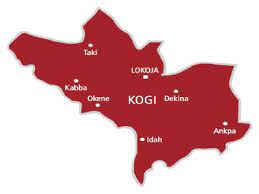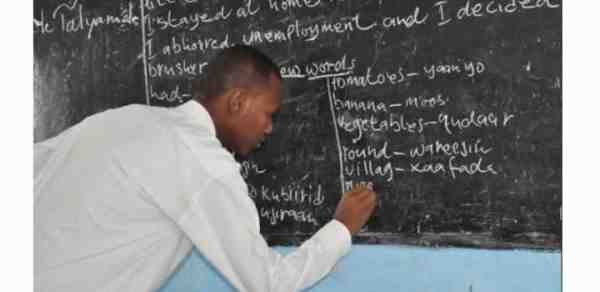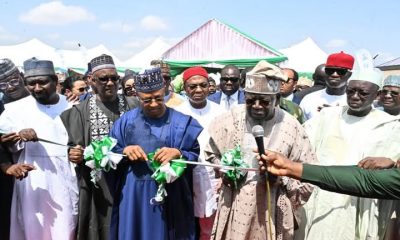OPINION
Ahmed Ododo Usman: A Half -year Report Card
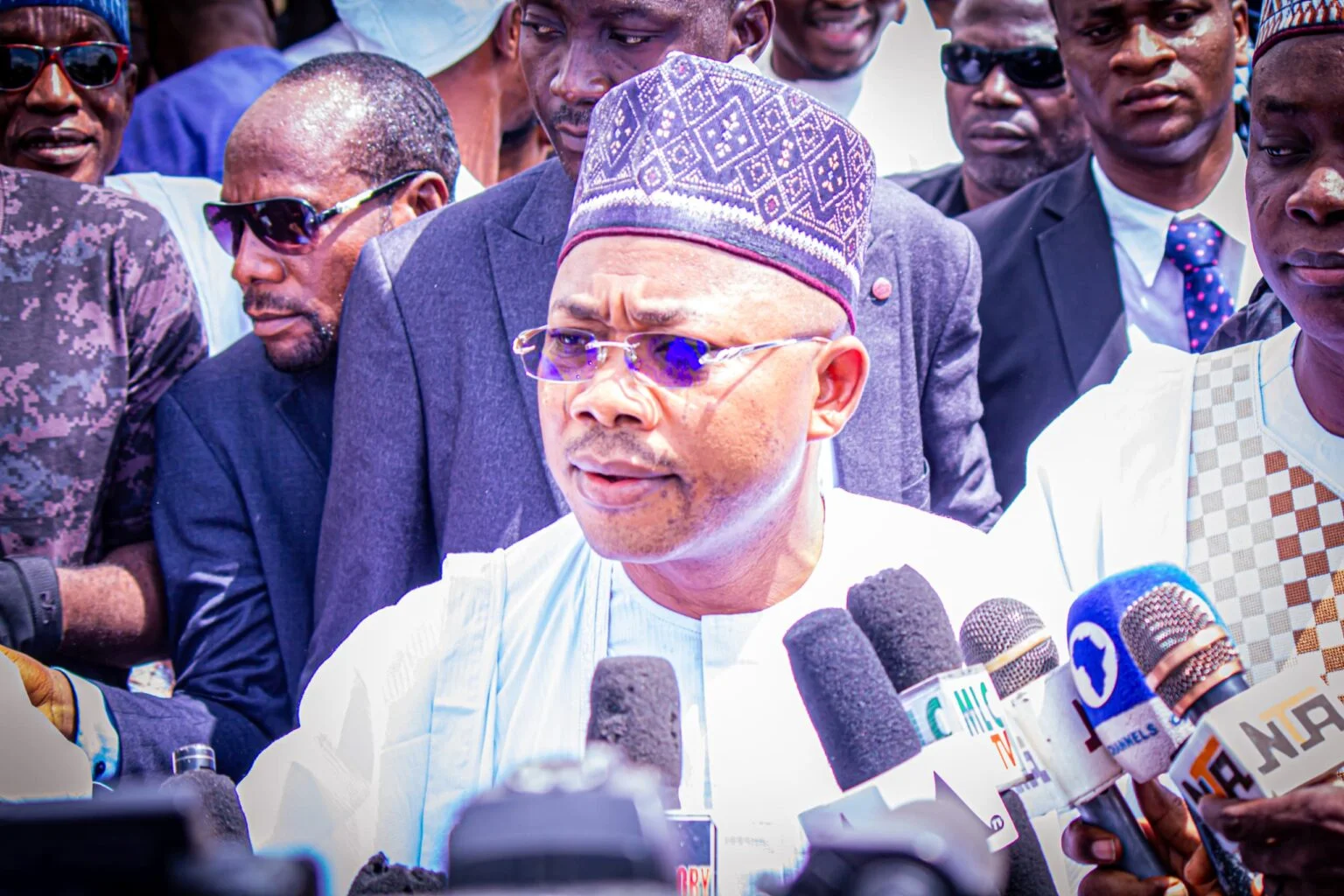
By Tunde Olusunle
Minders of Ahmed Usman Ododo the governor of the confluence state of Kogi flung him into the public square of opprobrium and derision last May. Ododo by the way was the Auditor-General in-charge of local government under Bello. The orchestra of sycophants he inherited from his benefactor and predecessor, Yahaya Bello, eager to ingratiate themselves to him articulated a “First 100 Days In Office” programme for him.
These included Ododo having to name his specific achievements within his preliminary months on the saddle. Ododo’s meeting with Nuhu Ribadu, the National Security Adviser, (NSA); a civic reception organised in his honour in Okene his hometown and his participation in a meeting of the “Progressive Governors Forum,” (PGF) in Abuja, were listed as his notable achievements. Within the period, Ododo alongside his colleagues from Ondo and Taraba states, Lucky Aiyedatiwa and Kefas Agbo, had a meeting with the Minister for Agriculture and Food Security, Abubakar Kyari. This perfunctory obligation was also recorded as one of his feats within his First 100 Days.Days and weeks thereafter, Ododo was cadaver for analysts and public scholars, scandalised by the newcomer governor’s ludicrous yet proudly publicised report card. Many people from Kogi became the butt of jokes by those who believed the state was capable of better quality brand ambassadors. Ododo’s case was not helped by the fact of the circumstances of his emergence as governor and successor to Yahaya Bello. The latter’s hellish and brutish, eight-year sojourn in *Lugard House,* Lokoja is best forgotten. Ododo emerged courtesy of a benefactor who visited so much malevolence and meanness on the polity. This credential easily blighted his candidature and acceptability. Bello’s current travails in the hands of the nation’s foremost anti-graft agency which has made a scurrying fugitive of the man who patented himself the “white lion” during his virtual monarchy, is largely construed as karma come to justice. A successor installed by such a character must of necessity share his DNA, was the understandably popular belief.
I have in the course of duty over the decades, encountered and engaged robustly with all but two military and civilian governors of Kogi State since the inception of the state. From the foundation military administrator in 1991, Colonel Danladi Zakari, through Abubakar Audu, (the departed pioneer civilian governor of the state) who appointed me Director of Information and Public Affairs in 1992, I was intertwined with the evolution of the state. Paul Omeruo, also an army Colonel who succeeded Audu in 1993, appointed me his Chief Press Secretary in 1995. He passed me on to Bzigu Afakirya, (of blessed memory), his successor in 1996. I didn’t get to meet Augustine Aniebo who replaced Afakirya in 1998. I also had varying degrees of latter day relationships with Audu who returned as democratically elected governor in 1999, and his successors Ibrahim Idris and Idris Wada.
I had a fleeting encounter with Bello back in 2017 while I pursued state assistance for the young family of my colleague, brother and friend, Onukaba Adinoyi-Ojo who tragically passed earlier that year. Bello was inaccessible to the two-man delegation empanelled by the “Board of Trustees of the Adinoyi-Ojo Onukaba Endowment Fund,” to follow up with him on possible state assistance for our fallen compatriot’s family. Maxwell Gidado, SAN, OON, professor of law and my good self constituted that team. My chance meeting with Bello in Lokoja, mid-2017, was at an event organised by the Kogi State Chapter of the Nigerian Union of Journalists, (NUJ) which invited me. I graced the high table with Bello at the event and he promised to get his Chief of Staff to fix a meeting on the subject. He never did. That was my first ever, and only encounter with him.
Beyond glimpses of him on television and in photographs of media reportage on him, I’ve never set my eyes on Ododo. He doesn’t know me either. Except if he’s been following my work as a media practitioner, who comes from his state. Ododo may yet surprise many, however, judging from his much spoken about humanistic performance thus far. He may be gradually trying to carve an identity for himself, despite the backstage encumbrances of his erstwhile boss. Ododo we are hearing is humble, unassuming and sensitive. He is said to have prioritised workers welfare thus far. They tell you he began by paying a markedly improved 80% of salaries compared to his benefactor’s who undermined his constituents with unbelievably mendicant sums. Ododo now, however, is said to now pay 100% emoluments to his constituents. Kogi State remains a “civil service” entity. It is no where near your Lagos, Ogun, Rivers, Delta, Oyo, which are blessed with sundry producing and manufacturing concerns which impact their domestic economies. The local economy of Kogi State is powered by the spending capacity of civil servants. Whatever impacts the wallets of bureaucrats therefore takes a heavy toll on their capacities to patronise the open markets, shops and pharmacies.
Kogi State was notorious for state-induced violence and insecurity under Ododo’s former Principal. Political top shots were alleged to have cultivated and sustained “private armies.” The streets were ruled by substances, machetes and automatic weapons. These combined to scare indigenes of the state and indeed risk taking investors from the state. It is suggested that the air in Kogi State these days is more temperate. Ododo was reportedly on the front foot when some miscreants terrorised student communities in Adankolo, Bassa, Crusher and Felele districts of the state capital, in March. Three suspects were arrested and have since been arraigned in court. Ododo equally made vociferous appeals to the nation’s topmost security commands when students of the state-owned *Confluence University of Science and Technology,* (CUSTECH), were abducted weeks ago.
Helicopter-backed special detachments were swiftly deployed to comb the forests and thickets of Kogi, including the state’s abutments with Kwara and Ekiti states. Kogi State by the way, is bordered by nine states in the North Central, South West, South East and South South zones. Not forgetting its close proximity to the Federal Capital Territory, (FCT). This geographical reality therefore makes the state susceptible to infiltration from different entry points. Working with ground troops, local hunters and vigilantes on the recent operation, some kidnapped victims were rescued and some of their ransom-seeking abductors summarily apprehended. That episode is said to have sent a clear message to criminal venturers that Kogi State is forbidden zone for mischief. It also rekindled the belief of the people that the incumbent leadership in the state can protect its own after all.
The Ododo dispensation has also embarked on an ambitious infrastructural renewal effort at the local levels. Internal roads in major communities in the state are at various levels of completion. These include roads in Egbe, (Yagba West); Aiyetoro-Gbedde, (Ijumu); Mopa (Mopamuro); Felele-Agbaja (Lokoja LGA); Oguma (Bassa LGA); Idah, (Idah LGA); Abejukolo, (Omala LGA) and Anyigba (Dekina LGA). Instructively, this first list of communities which will benefit from a gradual community rebuild programme precludes any community in Ododo’s homestead in Kogi Central. Internally Generated Revenue, (IGR) in the state, recently posted a remarkable leap towards a monthly average of N2 Billion. For a state like Kogi, this means a lot. This upward ascent of the state’s IGR may be a result of increasing transparency in the revenue collection process, just maybe.
About 200 tractors we hear are being recalled by the Kogi State government for rehabilitation. This is just as the Ododo administration is reported to be tapering towards the prioritisation of agriculture. The government is launching a “Wet Season Agricultural Intervention Programme” to this effect towards ensuring food security. The agenda also involves making agriculture attractive to the teeming youth population as against the subsisting craze for “political involvement.” Farm locations have been identified in 76 communities, in the 21 local government areas in the state. Government intends to prepare 7000 hectares of land for farming in the first instance. This may seem a far cry from the one million hectares which Umaru Bago the Niger State governor has prepared in his state. But every journey, the old saying reminds us, begins with the very first step. Farmers will be provided free seeds and chemicals towards the actualization of this project. Three crops: cassava, maize and rice are being emphasised in the experimental endeavour.
At harvest, the state government hopes to buyback the produce, concede 60% of the earnings to the farmers and take the smaller 40%, as incentive to ambivalent farmers. If Ododo is thinking and acting in the directions we have identified above, he could be said to have set about on the right course. Kogi State has lost substantial segments of its near 33 years of existence to laggards and loafers in the name of helmsmen. He needs to do much more though to rekindle the faith of his constituents in the committed sensitivity and service of his era to have their backs round the clock, round the calendar. History is ever in the firm grips of the neck of the pen, as evergreen assessor and unforgettable retainer of institutional memory. Kogi State must awaken from perpetual sedation. And now is the time.
*Tunde Olusunle, PhD, is a Fellow of the Association of Nigerian Authors, (FANA)*
OPINION
The Mokwa Tragedy
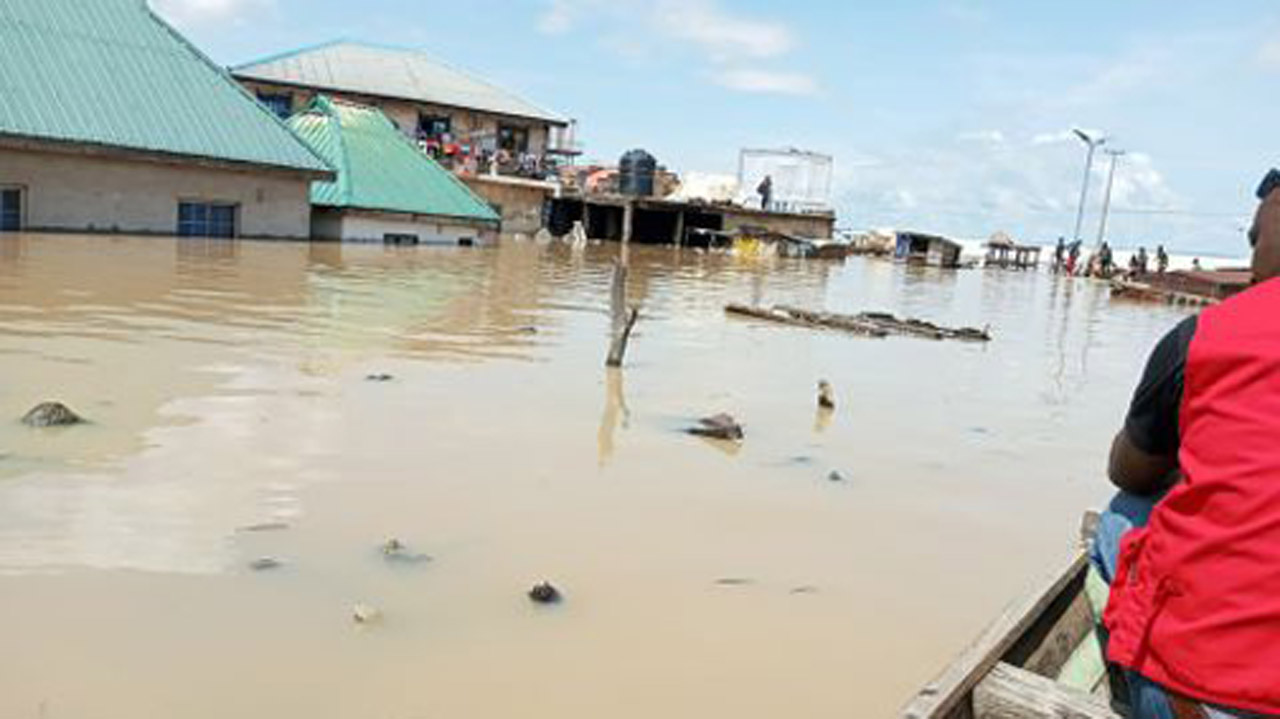
By Zayd Ibn Isah
There are calamities so devastating that in their aftermath, they ought to bring a nation to a halt, inspiring somber moments that should pierce through the noise of our politics, our tribal squabbles, and our digital distractions.These are the sort of tragedies that should unite people in a collective sense of grief, shock and loss.
The recent flood in Mokwa, Niger State, where raging waters swept away hundreds of men, women, and children, is one such tragedy. Unfortunately, this is the second major disaster to hit Niger State this year. Earlier, a fuel-laden tanker overturned, and instead of fleeing from the highly flammable spill, nearby residents rushed to have a fair share of the liquid black gold.The inevitable explosion that followed is estimated to have killed nearly a hundred people. Just as the nation was still reeling from that terrible tragedy, Mokwa was plunged into even greater sorrow. According to recent statistics reported by Daily Trust, over 200 lives have been lost in the recent flood, and around 500 people remain missing.Beyond lives lost, this particular flooding has displaced thousands, destroyed properties and placed many in severe financial ruin.Sadly, disasters like this are not new to us. From the Ogunpa flood in Ibadan in 1980 that claimed more than 200 lives, to the catastrophic floods of 2012 that affected 30 of Nigeria’s 36 states and displaced over two million people, to the recent floods in Borno, where waters from the Dam left destruction in their wake, a clearly predictable pattern seems to constantly emerge, especially when the rainy season comes.Nigeria has become painfully familiar with the sight of submerged communities, displaced families, and dreams washed away. What makes these disasters particularly heartbreaking is not just their frequency, but how preventable they often are.Yes, climate change is real. Rainfall patterns are shifting, and rivers are swelling beyond their historical bounds. But we must also confront an uncomfortable truth: we are not entirely innocent victims of nature’s fury.Across Nigeria, it is disturbingly common to see houses, shops, and even schools built on floodplains and natural waterways. Rivers are choked by illegal settlements, often constructed without proper approval or in blatant disregard of environmental laws.Yet, when government agencies move to demolish these structures, we cry foul. We accuse them of ethnic bias, political witch-hunts, or insensitivity. We shout “persecution,” when the real culprit is our collective refusal to listen to reason.Mokwa is a painful reminder of what happens when planning is ignored and nature is provoked. Urban planning in Nigeria is in crisis, not merely because government agencies fail to enforce regulations, but because we, the people, treat these rules with contempt.We bribe our way through approvals, circumvent safety protocols, and then feign surprise when disaster strikes. But floods don’t negotiate. They also certainly don’t recognise tribe, religion, or political affiliation. They simply follow the laws of nature. And if we insist on living in their path, the consequences, however tragic, are entirely avoidable.We must recognise that lives are at stake and that for survivors, the process of trying to rebuild or relocate while dealing with grief and loss, is often a difficult experience. This is why we must begin to change the way we talk about demolition and enforcement. The government is not your enemy when it clears structures built on waterways.On the contrary, such actions, when carried out transparently and justly, are lifesaving. We must stop romanticising illegal construction as a symbol of resilience. More often than not, it is a death sentence in disguise.That said, this is not the time to trade blame. It is the time to chart a new course. Flooding is not just a Nigerian problem. It is a global emergency. In recent months, Germany and Belgium were overwhelmed by deadly flash floods that claimed hundreds of lives. Brazil witnessed entire communities buried under mudslides triggered by torrential rains.In Bangladesh and India, millions were displaced after rivers burst their banks. Even the United States, despite its infrastructure, has seen cities like Houston and New York struggle to cope with overwhelming rainfall.In many of these countries, governments responded decisively; issuing timely evacuation orders, mobilizing rescue operations, and, crucially, relocating people from high-risk zones.In Japan and the Philippines, public education on disaster preparedness is rigorous and widely embraced. In the Netherlands, the government has invested heavily in flood defenses like levees, water plazas, and adaptive urban design.But here in Nigeria, even when relevant government agencies issue warnings, or evacuation is proposed, people resist. Sometimes it’s the deep emotional bond we have with our ancestral land. Other times, it’s the justified fear that relocation means abandonment, that once we leave, no one will remember us. And often, it’s simply that we have nowhere else to go.Yet we must acknowledge a timeless truth: prevention is better than cure. A stitch in time saves nine. As such, we need long-term solutions: proper drainage systems, enforced building codes, updated flood risk maps, and continuous public education on environmental responsibility.But beyond all that, we need a cultural shift, a collective understanding that human life is more valuable than temporary shelter, and that following the law is not a punishment, but a protection.The tragedy in Mokwa must not become just another headline. It must be a turning point. We should not just fall back on “thoughts and prayers”, lamentations, and vague promises to offer relief to victims. Rather, this should spur us all to insist on strict environmental and infrastructural maintenance, as well as effective measures for disaster preparedness, particularly when imminent disasters are as a result of climate change.We need to plan the development of our cities better, especially when it comes to constructing and maintaining proper drainage channels, managing waste disposal and ensuring that waterways are not impeded by illegal structures. We also need to be united in ensuring this becomes a national moment of reckoning, especially one where we begin to rethink how we live with our environment, and with one another.If we continue to build on water, water will continue to subject us to the terrifying laws of nature.Zayd Ibn Isah can be reached at lawcadet1@gmail.comOPINION
Nigeria’s Security: Between Self-defence and Community Policing

By Mukhtar Ya’u Madobi
As Nigeria continues to battle worsening security challenges — ranging from banditry and kidnapping to terrorism, insurgency, and communal violence — citizens across the country are increasingly embracing grassroots security measures and calls for self-defence.
These challenges are not confined to the North. In the South, militancy, piracy, secessionist agitations, cultism, and cybercrimes further complicate the nation’s fragile security landscape. Speaking at the maiden annual lecture of the National Association of the Institute for Security Studies, themed “Mobilising Stakeholders to Curb Insecurity in Nigeria: A Practical Approach,” the Director-General of the State Security Service (SSS), Oluwatosin Ajayi, stressed the need for communities to take greater responsibility for their own security. He cited examples where local populations had historically repelled insurgents and urged communities to work closely with security agencies to counter threats such as terrorism, banditry, and kidnapping.Ajayi noted that it is unrealistic to expect security agencies to protect every citizen across Nigeria’s expansive territory. He argued that communities must serve as the first line of defence, and that empowering them would enhance grassroots resilience, while reducing over-reliance on federal forces.Echoing this position, former Chief of Defence Staff, General TY Danjuma (rtd), recently renewed his longstanding call for Nigerians to rise in self-defence against non-state actors. Reacting to fresh waves of violence in Plateau, Benue, and other states, Danjuma insisted that citizens can no longer afford to remain passive while bandits and terrorists wreak havoc.“The warning I gave years ago remains valid. Nigerians must rise and defend themselves. The government alone cannot protect us,” he said.This message of self-defence has increasingly resonated across vulnerable communities, reflecting the harsh reality of an overstretched security system that leaves millions exposed. The roots of the crisis lie in decades of state neglect, porous borders, weak intelligence systems, and economic exclusion.In the North-West, states such as Zamfara, Katsina, and Kaduna are under the siege of bandits, who raid villages, rustle livestock, extort ransoms, and impose levies. In the North-Central region, particularly Plateau and Benue states, farmer-herder conflicts have morphed into sustained ethno-religious violence. The South-East contends with secessionist violence linked to IPOB/ESN elements, who often target security infrastructure. Meanwhile, the South-West and South-South struggle with cultism, ritual killings, and piracy.One chilling episode was the abduction of more than 280 schoolchildren in Kuriga, Kaduna State, in March 2024. Although the children were eventually rescued, the incident laid bare the glaring weaknesses in Nigeria’s security infrastructure and left the community traumatised.Faced with these realities, several states have begun taking their destinies into their hands. In April, the Kano State Government passed the Security Neighbourhood Watch Law to create a legal framework for community-led security efforts. Katsina has trained local vigilantes through its Community Watch Corps, while in Zamfara, Governor Dauda Lawal launched the Community Protection Guards (CPG), a controversial but welcomed initiative in rural areas long neglected by formal forces.In the North-East, the Civilian Joint Task Force (CJTF) continues to support military efforts against Boko Haram, leveraging local knowledge and swift response capabilities. The Amotekun Corps in the South-West, headquartered in Ondo State, has addressed critical security gaps in the region, earning both criticism and praise. Similarly, the South-East’s Ebube Agu and joint regional outfits in the South-South emerged from the growing public distrust in the federal government’s ability to guarantee safety.However, the growing wave of self-defence and vigilante initiatives raises ethical, legal, and practical concerns. Nigeria’s Firearms Act prohibits civilians from bearing arms without a licence. Without a clear regulatory framework, arming civilians risks escalating violence, enabling political thuggery, and creating new security threats under the guise of protection.These dangers are not hypothetical. In Edo State’s Uromi community, vigilantes wrongfully accused 16 Northern hunters of being kidnappers and burnt them alive. In July 2022, Ebube Agu operatives reportedly killed 14 unarmed wedding guests in Otulu, Imo State. Other vigilante groups in the region have been implicated in extrajudicial killings and abuses. A Daily Trust investigation in April revealed that vigilante groups killed at least 68 people in three months, with many more subjected to torture, harassment, or unlawful detention.These developments have prompted the House of Representatives Committee on Army to call for the regulation, oversight, and training of vigilante groups. The Uromi killings, in particular, triggered national outrage and renewed demands for accountability.Responding to these concerns, Major General Chris Olukolade (rtd), chairman of the Centre for Crisis Communication, acknowledged General Danjuma’s fears but cautioned against unregulated civilian self-defence. He warned that unless communities are engaged within a structured and legal framework, insecurity may only worsen. According to him, civilians should not be armed unless integrated into formal security systems with clear guidelines.Against this backdrop, community policing has emerged as a more sustainable and coordinated alternative. Under the leadership of the Inspector General of Police, pilot schemes have been launched across several states. These involve recruiting and training locals for surveillance, intelligence gathering, and early intervention, followed by their integration into existing police structures.Lagos, Ekiti, and Kano States have all recorded notable progress. In Kano, the Hisbah Corps, initially tasked with moral enforcement, has been reoriented to contribute to broader urban security. In Lagos, the Neighbourhood Safety Corps plays a vital role in gathering intelligence and issuing early warnings.Nonetheless, community policing faces serious limitations. Funding shortfalls, inter-agency rivalries, and a lack of coordination continue to undermine its effectiveness. A major stumbling block is the constitutional contradiction where state governors are designated as chief security officers but lack control over federal police operations within their jurisdictions.Solving Nigeria’s security crisis requires a comprehensive strategy that addresses institutional, legal, and socio-economic issues. First, the constitution must be amended to empower state and community policing structures with defined jurisdictions and robust oversight. Second, vigilante and self-defence groups must be trained, regulated, and integrated into the formal security architecture to avoid becoming a threat themselves. Third, intelligence gathering should begin at the grassroots, where community members are often the first to notice early warning signs. Fourth, addressing the root causes of insecurity — such as unemployment, poverty, and youth disenfranchisement — through investments in education, job creation, and social empowerment is essential. Lastly, traditional and religious leaders must be given formal roles in mediation, peacebuilding, and community-based conflict resolution, given their influence and trust within local populations.Nigeria’s security challenges demand more than rhetoric and reactive responses. While the instinct to defend oneself is natural in the face of government failure, unregulated self-defence is a risky and unsustainable path. The lasting solution lies in creating a decentralised, community-driven security model rooted in legality, ethics, and shared responsibility.As communities across the country face mounting threats, the question is no longer whether to adopt localised security strategies — but how best to coordinate, empower, and regulate them before chaos becomes the norm.Mukhtar Ya’u Madobi is a research fellow at the Centre for Crisis Communication. He can be reached via ymukhtar944@gmail.com.
OPINION
This Trial of Oloyede
By Tunde Akanni
It’s been traumatic for my entire family since that video started making the rounds. I sneaked a slight view… It’s our trial. It’s my trial. Oloyede is genuine. He is most sincere. He is modestly so, as well. For us, however, Allah knows best.
I was with a trader in the afternoon of what I considered a dark Wednesday, the 14th of May. “Se bi won ni JAMB o get mo bayi…”. I had to cut in immediately. Which JAMB? “Madam, that’s one person I will vouch, and vouch for…zero tolerance for corruption. Absolutely responsible with a high level of consciousness for the good of others. If certain things went wrong at JAMB, I agree it’s his responsibility to carry all pleasant and other burdens but just know that the bad side of the operations may as well be sabotage. I have absolute trust in that man. Ask my own colleagues about me, but Oloyede is my own hero, somebody I have known for more than 40 years…”This is by no means a reductionist disposition to the tragedy induced by the so-called computer glitch. May the Almighty God in His infinite mercy console the parents of the candidate reported to have committed suicide. May God strengthen them to survive this gloomy phase of their lives and sustain them to reap bountiful compensation that will endure in their lives. It’s hard, so hard to pull tragedies of this magnitude. I personally feel for these parents.The said computer glitch, may we never fall victim to it. Those who work for big organisations requiring a large layout of ICT operations know what I’m talking about. Rather than being ‘solutional’, IT facilities can be unimaginably problematic sometimes, yet indispensable in this civilisational dispensation. This is not doubting deliberate sabotage, as may have happened in the case of JAMB. I’ve been part of Oloyede’s JAMB journey to attest to his commitment to offer his best for the otherwise sinking board.Far from being cosmetically exhibitionist, the Oloyede-led JAMB team, led by the Education minister, Tunji Alausa, went round the critical facilities of JAMB during the just concluded examination. Alausa saw, firsthand, like never before elsewhere in this country, how far JAMB had gone in its strive for transparency and the real-time monitoring of the conduct of examinations nationwide. Alausa, beyond being in awe, sought to make the JAMB effect spread immediately to other examination bodies.No be dem say, same day, the WAEC team came to JAMB and made it into the situation room, which was my own duty post. The NECO team followed suit afterwards, both duly led around by the sturdy lead IT consultant who’s been reliably there from Oloyede’s assumption of duty, Damilola Bamiro. Far richer, given that they charge more for their exams, the duo of WAEC and NECO were suddenly mandated to understudy the examination sector leader in Africa that JAMB has become over time.The staff of both WAEC and NECO suddenly had to undertake a professional excursion led through all the real time monitoring screens and other digital facilities. It was obvious they marvelled at what they saw, revealing a functional leader-subordinate synergy manifest with trendy output that the world can see and learn from.But that may even seem like the tip of the iceberg of the output of the hard work and commitment of the nation’s foremost icon of integrity in public service. A series of far more seemingly serious strides had been accomplished by Oloyede at JAMB. As a focused scholar, he keeps ensuring that every bit of the experience of the Board is treasured as worthy data to guide future actions and even subjects for further research.Not even the agencies dedicated to emergency matters in Nigeria could have been as prompt as the Oloyede management on this ugly glitch saga. Once the complainants began ventilating into the public space, JAMB rose to the challenge without any predictably traditional arrogant stance of government is always right. I was aware that a particularly strident public critic and a former students’ leader at Obafemi Awolowo University, Adeola Soetan commended the spokesperson for JAMB for the excellent handling of public complaints.Promptly, an independent team of investigators was set up to unravel the mystery leading to the rather depressing situation that now confronts us. The team, drawn from assorted but technically relevant constituencies, has found out that no fewer than 165 centres of over 800 examination centres nationwide were affected.Obviously well prepared for whatever the outcome may turn out to be, he braced up to the challenge to embrace the surrender value to tell it to the world as it is. This trial is for all of us who believe and trust Oloyede. I am in this group. So much so that his public cry infected me…It was a patriot’s cry for his beloved country. Like me, a former Law don at LASU, Dr Kilani wasn’t any less affected as demonstrated in a quick note to me: “I write to associate myself with the pain, sorrow and emotion of our own Professor Oloyede. I could not hold my tears seeing him cry. May Almighty Allah see him through. May we all not be put to shame…”But then came a soothing message from Gbade Osunsoko, my cousin: “…He will come out of this much stronger because Nigerians will trust him far better than a number of our leaders.. A man that makes mistakes happens under him and takes responsibility – it’s a big deal in Nigeria.”With Oloyede, young Nigerians with challenges regarding sight are no longer left to moan their fate endlessly, with adequate provision for their inclusion in the UTME. How many of our public facilities are this inclusion conscious as stipulated by SDGs? How come a legacy built through almost a decade at the very best cost ever possible will be made to crumble when the game changer leader remains ever modest? JAMB has steadily risen through thick and thin to accomplish its tasks to the admiration of stakeholders, nationally and internationally, under Oloyede. Both NNPC and the Nigeria Police, being beneficiaries, can attest to the current competence of JAMB. How many other numerous stakeholders nationwide never deemed to have any relevance to JAMB before Oloyede but have since become critical, if not indispensable players?But why does this sudden saddening encounter threaten our joy of service without blemish? Why this unforeseen truncation of a good story, so intentional, coming from Africa? Whodunnit? Surely the truth shall come out for the world to perceive and assess and get to appreciate the efforts and the quantum of commitment appropriated to the JAMB excellence project driven by Oloyede.One cannot but be deeply concerned. Before the very eyes of a few of us carefully selected to give support from our respective professional perspectives from the very beginning, Professor Oloyede’s concern for genuine growth and development was real. It is still real and increasingly so, as a matter of fact. Indeed, inimitable. It shall be well.Tunde Akanni is a professor of Journalism and Development Communications at the Lagos State University, LASU. Follow him on X:@AkintundeAkanni
